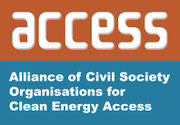Energy Access Skills of CSO for Advocacy
Process
- "while the mapping activity is on-going, a short list of topics are to be identified based on knowledge content and expertise that require actions beyond what is currently being done. An initial list of examples include, but are not limited to: (1) Last mile energy access (inclusiveness, remoteness and gender) and (2) Productive uses of energy and energy access under devolving processes (Decentralization of governance)."
- Structure of portal: list most important topics, maybe create separate articles for the major topics to be defined
- inputs by members: knowledge gaps, best practices, etc
- coordination via energypedia
Background/Main obstacles
In order to achieve SDG 7 on universal energy access by 2030, there is a clear need to go beyond business-as-usual and mobilize new, inclusive coalitions of stakeholders. Many civil society organizations (CSOs) and community-based organisations (CBOs) work with energy poor communities, including those in the last mile, delivering energy services as well as wider development programmes, and have trusted relationships with these communities. Founded in 2014, ACCESS is a global coalition of 64 organisations working at the local, national, regional and international levels delivering energy services to poor and marginal communities, carrying out research, capacity building and advocacy, and working with communities, businesses, governments, international donors and investors. ACCESS aims to strengthen the visibility and presence of CSOs and CBOs within energy initiatives at the national, regional and international levels. Using their expertise and experience, members seek to: • Improve other stakeholders’ understanding of the energy needs of poor communities; • Raise awareness and build demand for energy services and products among poor groups; • Build public understanding and political support for inclusive energy planning, and the enabling environment reforms needed to support delivery of universal energy access; • Design and deliver energy solutions with long-term development impact.
The NGO Energy Access Learning Group initiative is categorized under the knowledge and capacity building arm of the ACCESS coalition, composed of 65 CSOs and practitioners with extensive experience in energy access. It will act as a knowledge aggregator of best practices and expert advice, while providing technical support. The Learning Group will include experts from organizations based both in the global North and South.
Why
Involvement of CSOs on issues of energy access has increased alongside the growing global attention and action with the adoption of the 2030 Agenda and the development of SDGs. In particular, this learning group aims to accelerate the delivery of SDG7 and in turn, enhance the pace of achieving other SDGs. Numerous CSOs have indicated that it would be beneficial to access knowledge outside of their own network that provides timely, specific support on proven processes, technologies and methodologies for providing energy services to the poor. This is mainly due to the limited capacity of internal teams to provide suitable solutions, the limited understanding of the ‘development dividend’ and successful energy access processes among actors in the enabling environment (government, financiers, etc.), and the significant gap between knowledge demand and supply. In addition to this gap, lessons learned from provided solutions are not openly available to the CSOs working to provide similar solutions, therefore increasing the chance of repeating mistakes.
Added Value
The main areas in which significant value will be added include: growing the space to reach excellency by building on the ACCESS Coalition, improving coordination and collaboration between organizations, broadening learning outside the CSO space by engaging with key stakeholders, sharing/training of best practices between CSOs and other stakeholders, facilitating expert technical service, and closing the knowledge gap. Outcomes - Enhanced coordination and collaboration amongst CSOs and others will increase credibility and capacity to respond effectively to current energy access challenges. The increased capacity of enabling environmental stakeholders, including government and financiers, and the new CSOs enga
How civil society contributes to energy access
- Civil society drives inclusive energy processes CSOs have facilitated broad coalitions, built networks, coordinated and ensured inputs from non-energy sector players as well as from people and women’s groups that are often overlooked in energy debates.
- Civil society bridges national energy goals with local action CSOs have played a huge role in translating national energy policies into local solutions, and the other way around, linking needs at local level to the national agenda. Herewith they have supported governments in delivering inclusive energy policies for all.
- Civil society provides valuable energy expertise to governments CSOs support and work in partnerships with governments by providing valuable data and advising in policy formulation to secure last mile energy solutions, develop better standards and overcome barriers for investment and inclusive energy implementation.
- Civil society ensures finance reaches last mile solutions CSOs have enabled financing models to deliver last mile energy solutions. They have done so by lobbying for increased budget for decentralised renewable energy at the national level, and by facilitating new financing mechanisms for implementation at the local level and in support of local women led energy enterprises.[1]
What can CSO do, what private sector cannot
- ...
Relevant Topics
- (1) Last mile energy access (inclusiveness, remoteness and gender)
- (2) Productive uses of energy
- energy access under devolving processes (Decentralization of governance)
Definitions
- Last mile
- Productive use
Skills
- List of skills needed by an CSO
Knowledge Gaps
- List of knowledge gaps identified among all ACCESS coalition members
Next steps forward to make civil society organisations even better
- Civil society organisations...




















